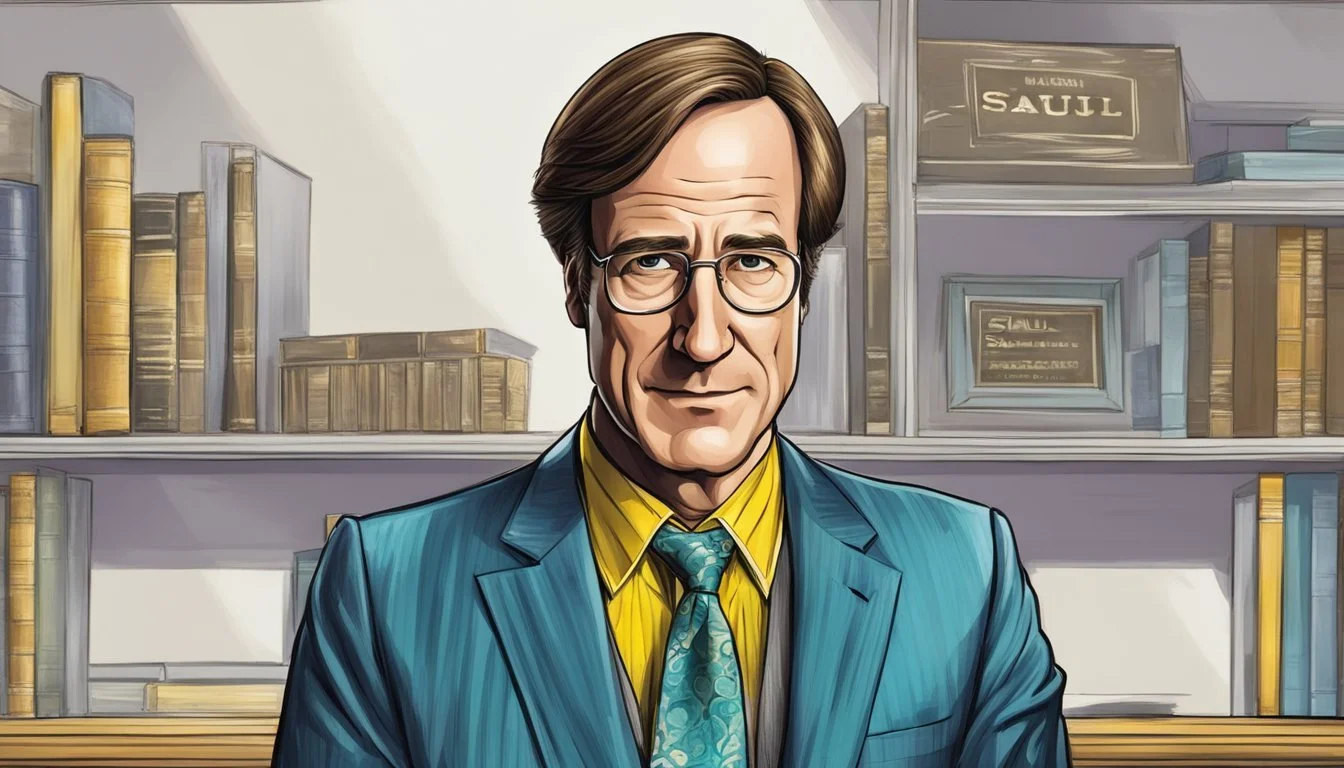The Evolution of Saul Goodman: From Sleazy Lawyer to Survivalist
A Character's Transformation in Breaking Bad and Better Call Saul
Saul Goodman, born James McGill, emerged as one of television's most complex and captivating characters. His journey from a small-time con artist to a flamboyant criminal lawyer captivated audiences in "Breaking Bad" and its prequel series "Better Call Saul."
Saul's evolution from Jimmy McGill to the morally flexible attorney known as Saul Goodman showcases a profound transformation driven by ambition, opportunism, and a refusal to conform to societal norms. Initially a public defender in Albuquerque, New Mexico, Jimmy gradually shed his past and embraced increasingly unethical practices to achieve success.
As Saul Goodman, he became the go-to lawyer for Albuquerque's criminal underworld, navigating legal and ethical gray areas with charm and wit. His journey reflects the complexities of moral compromise and the allure of power in a world where traditional ethics often take a back seat to personal gain.
Genesis of Saul Goodman
Jimmy McGill's transformation into Saul Goodman marked a pivotal shift in his identity and legal career. This change was influenced by early experiences and moral choices that shaped his path.
James McGill to Saul Goodman
Jimmy McGill began as a struggling lawyer working from a nail salon backroom. He faced numerous challenges in establishing his legal career, often resorting to unconventional methods. As a public defender, Jimmy gained experience but felt undervalued.
His decision to adopt the Saul Goodman persona stemmed from a desire for success and recognition. The name "Saul Goodman" itself was a play on words - "S'all good, man" - reflecting his charismatic and persuasive nature.
This new identity allowed Jimmy to shed his past failures and embrace a more flamboyant, morally flexible approach to law practice.
Early Influences and Morality
Jimmy's moral compass was shaped by his upbringing and relationship with his brother Chuck. As a young man, Jimmy engaged in petty crimes, earning the nickname "Slippin' Jimmy" for his con artist tactics.
His attempts to go straight were met with skepticism from Chuck, who viewed Jimmy as inherently unethical. This strained relationship pushed Jimmy towards more questionable practices in his legal career.
Jimmy's experiences as a public defender exposed him to the harsh realities of the justice system. This fueled his cynicism and willingness to bend rules for his clients.
Character Trajectory on 'Breaking Bad'
Saul Goodman's journey on 'Breaking Bad' is marked by moral compromises and increasing entanglement in the criminal underworld. His character evolves from a sleazy but relatively harmless lawyer to a key player in Walter White's drug empire.
Alliance with Walter White
Saul Goodman first encounters Walter White as a potential client, quickly recognizing the lucrative opportunity. He becomes Walt's legal advisor and money launderer, using his connections to facilitate the growth of the meth business. Saul introduces Walt to key underworld figures like Gus Fring and Ed the Disappearer.
As Walt's empire expands, Saul's role grows more crucial. He devises creative solutions to legal problems and helps orchestrate complex schemes. His witty one-liners and colorful suits become a signature part of his character.
Confrontation with Ethical Boundaries
Saul's moral flexibility is tested as Walt's criminal activities escalate. He participates in increasingly dangerous and illegal acts, from arranging hits to covering up murders. Saul often expresses reservations about Walt's more extreme plans but ultimately complies.
His ethical boundaries blur further when he suggests "sending Hank to Belize" - a euphemism for murder. This moment marks a significant shift in Saul's character, showing how far he's willing to go to protect his interests.
Saul's Crisis of Conscience
As Walt's empire crumbles, Saul faces the consequences of his choices. He becomes paranoid and fearful, realizing the depth of trouble he's in. His survival instincts kick in, leading him to consider fleeing even before Walt does.
In his final appearance, Saul advises Walt to turn himself in, showing a rare moment of moral clarity. He then chooses to disappear, adopting a new identity to escape his past. This decision reflects Saul's ultimate prioritization of self-preservation over loyalty or morality.
'Better Call Saul' and Character Exploration
Better Call Saul delves deep into Jimmy McGill's transformation into Saul Goodman, exploring the complexities of his character and relationships. The show examines his rise in the criminal defense world, his personal struggles, and his quest for legitimacy.
Building a Criminal Defense Empire
Jimmy McGill starts as a struggling public defender, taking on low-paying cases. His resourcefulness and unconventional methods help him build a reputation among Albuquerque's criminal element.
He adopts the persona of Saul Goodman, a colorful lawyer who promises to "make it legal." This alter ego allows Jimmy to embrace his natural talents for manipulation and showmanship.
Saul's practice grows through word-of-mouth and clever marketing schemes. He becomes the go-to lawyer for drug dealers and other criminals, expanding his influence in the underworld.
Complex Relationships and Betrayal
Jimmy's relationship with Kim Wexler is central to the series. Their romance evolves alongside their professional lives, often blurring ethical lines.
His brotherly bond with Chuck McGill is fraught with tension. Chuck's disapproval and sabotage of Jimmy's legal career deeply wounds him.
Mike Ehrmantraut becomes an unlikely ally. Their partnership highlights the grey areas of morality both characters navigate.
Jimmy's actions frequently betray those closest to him, including Kim and Chuck. These betrayals shape his journey and fuel his transformation into Saul.
Struggle for Redemption and Respect
Despite his unethical choices, Jimmy seeks validation from the legal community. He craves respect, particularly from his brother Chuck.
Jimmy's attempts at legitimacy often backfire. His past cons and questionable tactics haunt his efforts to be taken seriously as a lawyer.
The show explores whether redemption is possible for Jimmy. His actions as Saul Goodman make it increasingly difficult to return to a moral path.
Jimmy's struggle for respect drives him deeper into the criminal world. The more he embraces his Saul persona, the further he strays from his initial goals of recognition and acceptance.
Moral Ambiguity and Legal Ethics
Saul Goodman's career epitomizes the tension between ethical standards and professional success in the legal field. His actions challenge conventional notions of right and wrong within the legal system.
Ethical Standards Versus Success
Saul Goodman's approach to law often prioritizes results over ethical considerations. He consistently pushes the boundaries of acceptable legal practice to achieve victories for his clients. This strategy proves highly effective, earning him a reputation as a lawyer who can deliver outcomes in even the most challenging cases.
Goodman's tactics include manipulating evidence, bribing officials, and exploiting legal loopholes. While these methods yield results, they directly conflict with the ethical standards expected of attorneys. His success raises questions about the relationship between moral integrity and professional achievement in the legal world.
The character's journey highlights a crucial dilemma: Is it possible to maintain ethical standards while achieving high levels of success in a competitive legal environment?
The Justification of Unconventional Methods
Saul Goodman often rationalizes his unorthodox tactics as necessary for protecting his clients' interests. He argues that the legal system is inherently flawed and that his methods level the playing field for those who might otherwise be disadvantaged.
This justification reveals a complex moral calculus. Goodman views his actions not as purely self-serving, but as a form of justice within an imperfect system. He positions himself as a champion for the underdog, willing to bend rules that he perceives as unfair or arbitrary.
However, this reasoning blurs the line between advocacy and criminality. It raises critical questions about the limits of zealous representation and the potential consequences of disregarding ethical guidelines in pursuit of client interests.
The Cost of Moral Flexibility
Saul Goodman's moral flexibility comes at a significant personal and professional cost. His willingness to engage in illegal activities exposes him to legal jeopardy and compromises his standing within the legal community.
The character's descent into increasingly unethical behavior erodes his own moral compass over time. What begins as bending rules for seemingly justifiable reasons evolves into a pattern of disregard for legal and ethical norms.
This progression demonstrates the slippery slope of moral compromise in the legal profession. Goodman's journey serves as a cautionary tale about the long-term consequences of prioritizing success over ethical integrity. It illustrates how small ethical breaches can lead to more serious transgressions, ultimately threatening a lawyer's career and personal well-being.
Legal Tactics and Courtroom Strategies
Saul Goodman's approach to law blends creativity, cunning, and a willingness to push ethical boundaries. His methods often skirt the line between legal and illegal, employing unconventional tactics to achieve results for clients.
Gaming the Justice System
Saul Goodman excels at manipulating the legal process to his advantage. He leverages his deep understanding of procedural rules and courtroom dynamics to create favorable outcomes. One of his signature moves involves using lookalikes or stand-ins for defendants, confusing witnesses and undermining their credibility.
Goodman also employs strategic delays and technicalities to frustrate opposing counsel. He files numerous motions, challenges evidence on procedural grounds, and seeks continuances to wear down prosecutors or plaintiffs.
His theatrical courtroom presence aims to sway juries through emotion and misdirection rather than solely relying on facts and law.
Mastering Legal Loopholes
Goodman's expertise in finding and exploiting legal loopholes sets him apart from more conventional attorneys. He meticulously studies statutes, regulations, and case law to identify obscure provisions or interpretations that can benefit his clients.
This approach allows him to construct creative defenses and arguments that, while technically legal, often violate the spirit of the law. Examples include:
Using outdated laws still on the books
Exploiting jurisdictional conflicts
Finding novel interpretations of seemingly clear statutes
Goodman's ability to navigate these gray areas makes him a formidable opponent in court and a valuable asset to clients seeking to avoid legal consequences.
Public Image and Legal Gray Areas
Saul Goodman carefully cultivates a public persona that complements his legal tactics. His flamboyant advertising and catchy slogans ("Better Call Saul!") create an image of accessibility and effectiveness.
This public image serves multiple purposes:
Attracts clients seeking aggressive representation
Distracts from the questionable nature of his methods
Creates an expectation of unorthodox approaches in court
Goodman leverages this reputation to push the boundaries of legal ethics. He blurs the lines between zealous advocacy and misconduct, often engaging in behavior that skirts disbarment.
His willingness to operate in legal gray areas allows him to achieve results for clients that more traditional lawyers cannot, cementing his reputation as a "miracle worker" in the legal community.
Saul Goodman's Impact and Legacy
Saul Goodman left an indelible mark on popular culture and the legal profession. His character sparked discussions about ethics, ambition, and the consequences of moral compromises.
Cultural Reception and Fan Base
Saul Goodman quickly became a fan favorite character. His witty one-liners and outrageous antics resonated with viewers. Many found his resourcefulness and quick thinking admirable, despite his questionable methods.
Fans created memes, merchandise, and even cosplayed as Saul at conventions. His catchphrases entered pop culture lexicon. The character's popularity led to the creation of the spin-off series "Better Call Saul."
This prequel explored Saul's backstory, adding depth to his character. It garnered critical acclaim and a dedicated following of its own.
Comparison with Real-Life Legal Profession
Saul Goodman's portrayal sparked debates within the legal community. Some lawyers criticized the character for perpetuating negative stereotypes about attorneys.
Others saw Saul as an exaggerated reflection of real issues in the profession. His willingness to bend rules highlighted ethical dilemmas faced by lawyers.
The character served as a talking point in legal ethics classes. Professors used Saul's actions to discuss professional responsibility and moral boundaries.
Real-life attorneys distanced themselves from Saul's tactics. They emphasized the importance of ethical conduct and adherence to legal standards.
Lessons from a Cautionary Tale
Saul Goodman's journey serves as a warning about the dangers of unchecked ambition. His transformation from Jimmy McGill to Saul Goodman illustrates the slippery slope of moral compromise.
The character demonstrates how small ethical violations can lead to larger transgressions. Saul's choices show the long-term consequences of prioritizing success over integrity.
His story raises questions about redemption and whether it's possible to come back from a life of crime. The series explores themes of personal responsibility and the impact of one's actions on others.
Ultimately, Saul Goodman's legacy is complex. He remains a compelling character study of ambition, morality, and the human capacity for both good and evil.
Behind The Characters
Bob Odenkirk's portrayal of Saul Goodman and the creative liberties taken with legal practices shaped the character's evolution from a sleazy lawyer to a complex figure.
Bob Odenkirk's Portrayal of Saul Goodman
Bob Odenkirk initially had reservations about playing Saul Goodman in a spin-off series. He thought the character lacked depth, viewing Saul as merely a con man.
However, Odenkirk's perspective shifted when presented with the concept for Better Call Saul. The prequel series aimed to explore Saul's background and persona beyond his flashy TV commercials.
Odenkirk's nuanced performance brought Jimmy McGill to life, showcasing the character's transformation into Saul Goodman. His portrayal highlighted the complexities of Saul's character arc, from small-time con artist to morally ambiguous lawyer.
Creative Liberties in Television Law
Better Call Saul took creative liberties with legal practices to enhance dramatic effect. The show's writers, including Vince Gilligan and Peter Gould, crafted storylines that balanced entertainment with elements of real-world law.
While Saul Goodman's courtroom antics and questionable ethics may not align with typical legal practices, they served to illustrate his character's cunning and adaptability. The series explored the grey areas of the legal system, showcasing how Saul manipulated rules to his advantage.
These creative choices allowed the show to delve into complex moral dilemmas and showcase Saul's evolution as a character, while still maintaining a compelling narrative for viewers.
Reflections on Identity and Personal Growth
Jimmy McGill's transformation into Saul Goodman illustrates a complex journey of self-discovery and adaptation. His evolution reflects the profound impact of personal relationships and life experiences on shaping one's identity.
From Slippin' Jimmy to Esteemed Attorney
Jimmy McGill's early persona as Slippin' Jimmy showcased his cunning and ability to manipulate situations for personal gain. This foundation laid the groundwork for his future as a lawyer. As James McGill, he strived to build a legitimate career in law, driven by a desire for respect and success.
His transition to Saul Goodman marked a significant shift in identity. This new persona embraced the moral flexibility and showmanship that had always been part of Jimmy's character. Saul Goodman became a brand, allowing Jimmy to fully embrace his talents for manipulation and persuasion within the legal system.
The Role of Personal Relationships in Saul's Evolution
Key relationships played a crucial role in shaping Jimmy's identity throughout his journey. His brother Chuck's lack of faith in Jimmy's abilities as a lawyer pushed him to prove himself, often through questionable means.
Kim Wexler's influence was equally significant. Her presence initially anchored Jimmy to a more ethical path. However, their relationship also enabled some of his more dubious schemes. As their paths diverged, it contributed to Jimmy's full embrace of the Saul Goodman persona.
Professional connections, both legitimate and criminal, further molded Saul's identity. His interactions with figures in Albuquerque's underworld solidified his reputation as a "criminal" lawyer, blurring the lines between his personal ethics and professional conduct.
Survival and Adaptation in a Dangerous World
Saul Goodman's journey into the criminal underworld forced him to develop crucial survival skills. He learned to navigate treacherous waters while maintaining his own safety and financial security.
Handling Criminal Clients and Drug Trafficking
Saul became adept at managing high-risk clients involved in drug trafficking. He mastered the art of discretion, using burner phones and coded language to communicate sensitive information. Saul's legal expertise allowed him to exploit loopholes and create plausible deniability for his clients.
He developed a network of contacts in law enforcement and the criminal world. This network proved invaluable for gathering intelligence and staying one step ahead of potential threats.
Saul's ability to think on his feet saved him from dangerous situations multiple times. He learned to read people quickly and adjust his approach accordingly.
Financial Security Through Money Laundering
To protect his illicit earnings, Saul became proficient in money laundering techniques. He set up shell companies and used cash-intensive businesses as fronts for illegal activities.
Saul diversified his investments across legitimate and illegitimate ventures. This strategy provided a buffer against financial setbacks and law enforcement scrutiny.
He maintained separate identities and accounts to compartmentalize his affairs. This made it harder for authorities to trace his criminal connections and assets.
Preserving Self in the Face of Trauma
The constant danger and moral compromises took a toll on Saul's psyche. He developed coping mechanisms to deal with the stress and trauma of his lifestyle.
Saul created the flamboyant "Saul Goodman" persona as a psychological shield. This alter ego allowed him to distance himself from his actions and maintain a sense of control.
He learned to compartmentalize his emotions and rationalize his choices. This helped him navigate morally ambiguous situations without succumbing to guilt or despair.
Saul's adaptability became both his greatest strength and his greatest weakness. It allowed him to survive, but at the cost of his true identity.







